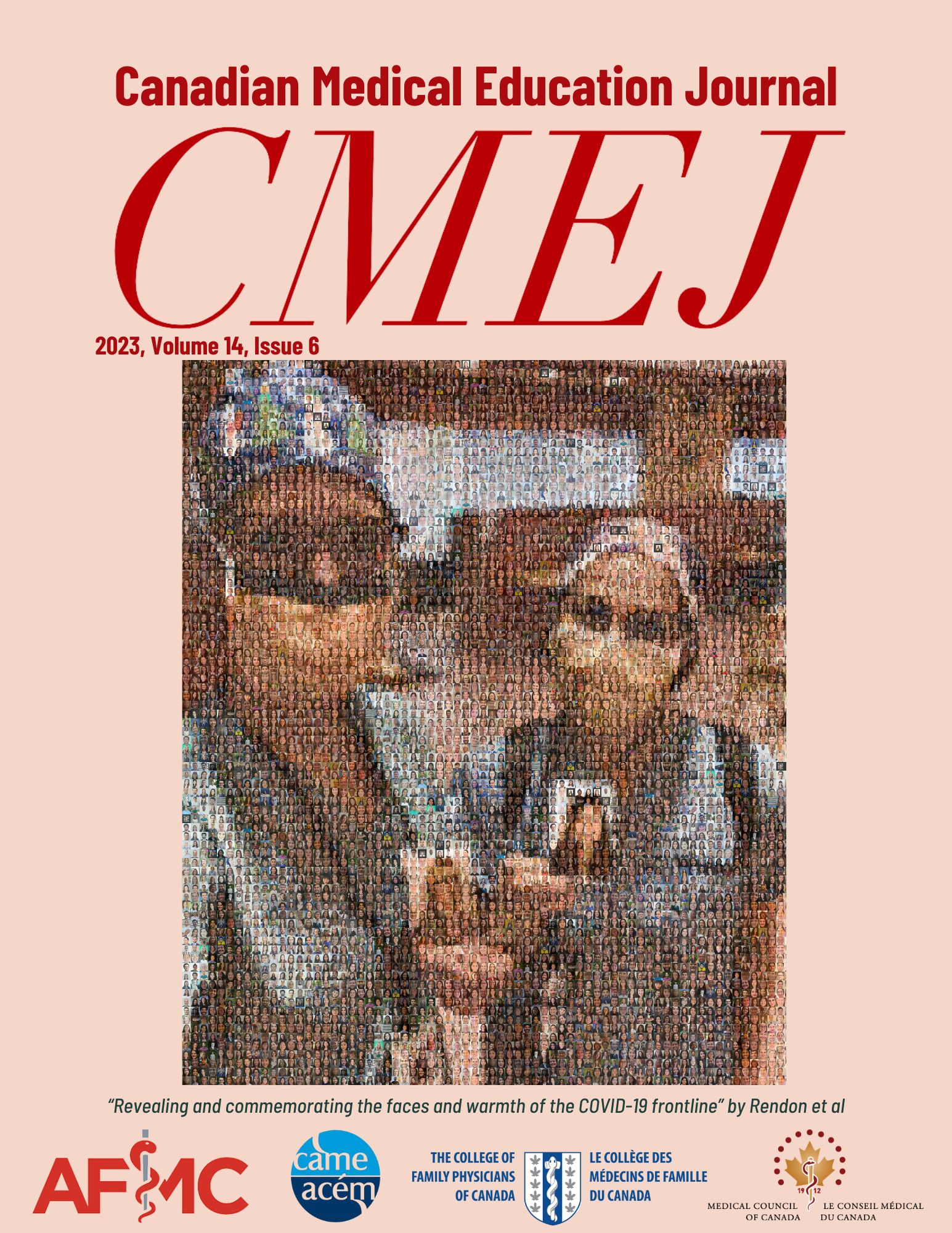Investigating the experiences of medical students quarantined due to COVID-19 exposure
DOI:
https://doi.org/10.36834/cmej.75571Abstract
Background: The COVID-19 pandemic profoundly impacted medical education systems worldwide. Between March 2020 and December 2021, 111 MD students at the University of Toronto completed two-week quarantines due to hospital or community exposures and experienced disrupted clinical instruction. We explored the experiences, barriers, and supports of these quarantined medical students to identify program development opportunities and improve student supports.
Methods: We used a qualitative descriptive approach to explore experiences of clerkship students quarantined due to COVID-19 exposure. Methods included an online survey with open-ended questions and an audio-recorded interview. We analysed the demographic survey responses using descriptive statistics. Subsequently, we conducted descriptive thematic analysis of the narrative survey responses and transcribed interview recordings.
Results: Concerns reported in surveys (n = 23, response rate 20.7%) and interviews (n = 5) included themes of illness uncertainty, racial tensions, confidentiality of COVID-19 status, unclear academic expectations, and financial burden. Supports included friends, family, and MD program administration. Recommendations related to communication, administration, equity considerations, supports, confidentiality/privacy, and academics.
Conclusion: Supporting student wellbeing and learning is at the core of medical training. Enhanced understanding of health profession trainee needs during COVID can improve institutional supportive responses to students routinely and during times of crisis.
References
Dhillon J, Salimi A, ElHawary H. Impact of COVID-19 on Canadian medical education: pre-clerkship and clerkship students affected differently. J Med Educ Curric Dev. 2020;7:2382120520965247. http://doi.org/10.1177/2382120520965247 DOI: https://doi.org/10.1177/2382120520965247
Gaur U, Majumder MAA, Sa B, Sarkar S, Williams A, Singh K. Challenges and opportunities of preclinical medical education: COVID-19 crisis and beyond. SN Compr Clin Med. 2020;2(11):1992–7. http://doi.org/10.1007/s42399-020-00528-1 DOI: https://doi.org/10.1007/s42399-020-00528-1
Sahi PK, Mishra D, Singh T. Medical education amid the COVID-19 pandemic. Indian Pediatr. 2020;57(7):652–7. http://doi.org/10.1007/s13312-020-1894-7 DOI: https://doi.org/10.1007/s13312-020-1894-7
Meo SA, Abukhalaf AA, Alomar AA, Sattar K, Klonoff DC. COVID-19 pandemic: impact of quarantine on medical students’ mental wellbeing and learning behaviors. Pak J Med Sci. 2020;36(COVID19-S4):S43–8. http://doi.org/10.12669/pjms.36.COVID19-S4.2809 DOI: https://doi.org/10.12669/pjms.36.COVID19-S4.2809
Charmaz K. Premises, principles, and practices in qualitative research: revisiting the foundations. Qual Health Res. 2004 Sep;14(7):976–93. http://doi.org/10.1177/1049732304266795 DOI: https://doi.org/10.1177/1049732304266795
Sandelowski M. Whatever happened to qualitative description? Res Nurs Health. 2000;23(4):334–40. http://doi.org/10.1002/1098-240x(200008)23:4<334::aid-nur9>3.0.co;2-g DOI: https://doi.org/10.1002/1098-240X(200008)23:4<334::AID-NUR9>3.0.CO;2-G
Kahlke RM. Generic qualitative approaches: pitfalls and benefits of methodological mixology. Int J Qual Methods. 2014;13(1):37–52. http://doi.org/10.1177/160940691401300119 DOI: https://doi.org/10.1177/160940691401300119
Mik-Meyer N. Multimethod qualitative research. In 2020. p. 357–74.
Braun V, Clarke V. Using thematic analysis in psychology. Qual Res Psychol. 2006;3(2):77–101. http://doi.org/10.1191/1478088706qp063oa DOI: https://doi.org/10.1191/1478088706qp063oa
Noble H, Heale R. Triangulation in research, with examples. Evid Based Nurs. 2019;22(3):67–8. http://doi.org/10.1136/ebnurs-2019-103145 DOI: https://doi.org/10.1136/ebnurs-2019-103145
Student Outbreak/exposure Management Plan (StOMP) Available from: https://md.utoronto.ca/student-outbreakexposure-management-plan-stomp. [Accessed on Nov 20, 2022].
O’Byrne L, Gavin B, Adamis D, Lim YX, McNicholas F. Levels of stress in medical students due to COVID-19. J Med Ethics. 2021;47(6):383–8. http://doi.org/10.1136/medethics-2020-107155 DOI: https://doi.org/10.1136/medethics-2020-107155
Kerr AM, Spaeth LD, Gerome JM. Medical students’ stress and uncertainty during the COVID-19 pandemic. Health Commun. 2022;0(0):1–11. http://doi.org/10.1080/10410236.2022.2062826 DOI: https://doi.org/10.1080/10410236.2022.2062826
Zdiarski E, Dunkel NW, Rollo JM. Campus crisis management: a comprehensive guide to planning, prevention, response, and recovery. In: Choice Reviews Online. 2007;p. 45-1598-45–1598. Available from: http://choicereviews.org/review/10.5860/CHOICE.45-1598 [Accessed on Jan 13, 2023]. DOI: https://doi.org/10.5860/CHOICE.45-1598
Izumi T, Sukhwani V, Surjan A, Shaw R. Managing and responding to pandemics in higher educational institutions: initial learning from COVID-19. IJDRBE. 2020;12(1):51–66. http://doi.org/10.1108/IJDRBE-06-2020-0054 DOI: https://doi.org/10.1108/IJDRBE-06-2020-0054
Perez-Urbano I, Williams JC, Jowhar ZM. Institutionalizing rest in response to racial and sociopolitical trauma. Acad Med. 2022;97(6):771. http://doi.org/10.1097/ACM.0000000000004391 DOI: https://doi.org/10.1097/ACM.0000000000004391
Agasisti T, Soncin M. Higher education in troubled times: on the impact of Covid-19 in Italy. High. Educ. Stud. 2021;46(1):86–95. http://doi.org/10.1080/03075079.2020.1859689 DOI: https://doi.org/10.1080/03075079.2020.1859689
HOW-R-U? project targets post-discharge social isolation Available from: https://www.boltonclarke.com.au/news-resources/corporate-news/how-r-u-project-targets-post-discharge-social-isolation [Accessed on Jun 20, 2022].
Boyd CJ, Inglesby DC, Corey B, et al. Impact of COVID-19 on away rotations in surgical fields. J Surg Res. 2020;255:96–8. http://doi.org/10.1016/j.jss.2020.05.049 DOI: https://doi.org/10.1016/j.jss.2020.05.049
de Oliveira Kubrusly Sobral JB, Lima DLF, Lima Rocha HA, et al. Active methodologies association with online learning fatigue among medical students. BMC Med. Educ. 2022 Feb 1;22(1):74. http://doi.org/10.1186/s12909-022-03143-x DOI: https://doi.org/10.1186/s12909-022-03143-x
Esterwood E, Saeed SA. Past epidemics, natural disasters, COVID-19, and mental health: learning from history as we deal with the present and prepare for the future. Psychiatr Q. 2020 Dec 1;91(4):1121–33. http://doi.org/10.1007/s11126-020-09808-4 DOI: https://doi.org/10.1007/s11126-020-09808-4
Downloads
Published
Issue
Section
License
Copyright (c) 2023 Sallie Han, Iris Kim, David Rojas, Joyce Nyhof-Young

This work is licensed under a Creative Commons Attribution-NonCommercial-NoDerivatives 4.0 International License.
Submission of an original manuscript to the Canadian Medical Education Journal will be taken to mean that it represents original work not previously published, that it is not being considered elsewhere for publication. If accepted for publication, it will be published online and it will not be published elsewhere in the same form, for commercial purposes, in any language, without the consent of the publisher.
Authors who publish in the Canadian Medical Education Journal agree to release their articles under the Creative Commons Attribution-Noncommercial-No Derivative Works 4.0 Canada Licence. This licence allows anyone to copy and distribute the article for non-commercial purposes provided that appropriate attribution is given. For details of the rights an author grants users of their work, please see the licence summary and the full licence.











